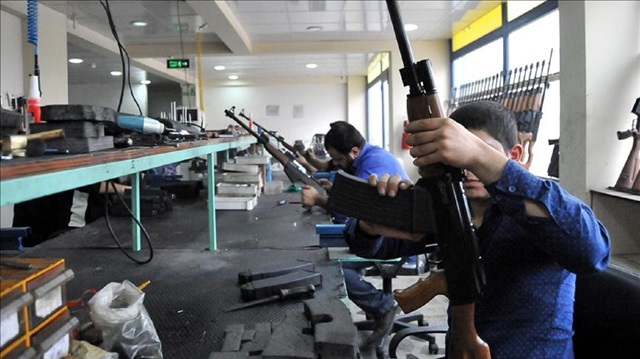
International Peace Research Institute says sales by Turkish companies rose in 2016, growing 27.6 pct
Arms sales by the world's top 100 arm producers rose 1.9 percent in 2016, the first year of growth in five years, with the U.S. and Western Europe taking an over 82 percent share, according to an international survey released Monday
The Stockholm International Peace Research Institute (SIPRI) -- behind the survey -- said in a statement Monday that sales of arms and military services by the world’s largest arms-producing and military services companies -- the SIPRI Top 100 -- totaled $374.8 billion last year, excluding China.
The total arm sales were equivalent to nearly 0.5 percent of global Gross Domestic Product, up 38 percent since 2002.
Topping the list was the United States, which continues to maintain the world's largest military expenditures. Companies from the world largest economy increased their sales by 4 percent last year to $217.2 billion, making the U.S. account for 57.9 percent of the total top 100 arms sales.
SIPRI said that U.S. military operations overseas as well as acquisitions of large weapon systems by other countries drove the rise.
"Lockheed Martin, the world’s largest arms producer, increased its arms sales by 10.7 percent in 2016, reaching $40.8 billion and significantly widening the gap between it and Boeing -- the second-largest arms producer," it added.
Sales of Western Europe arm producers totaled $91.6 billion, a rise of 0.2 percent from 2015.
U.S. and West European companies accounted for 82.4 percent of total arms sales for 2016, SIPRI said.
The Brexit decision does not seem to have had an impact on the arms sales of British companies, which rose 2.0 percent in 2016, SIPRI said.
According to SIPRI, arms sales by Russian firms in the top 100 continued to grow, rising 3.8 percent to $26.6 billion in 2016.
Companies from South Korea boosted their arms sales by 20.6 percent to $8.4 billion last year due to concerns over North Korea's missile and nuclear programs.
Arms sales of Brazilian and Turkish companies also rose in 2016, growing by 10.8 and 27.6 percent respectively.
"The growth in arms sales was expected and was driven by the implementation of new national major weapon programs, ongoing military operations in several countries, and persistent regional tensions that are leading to an increased demand for weapons," the group added.



